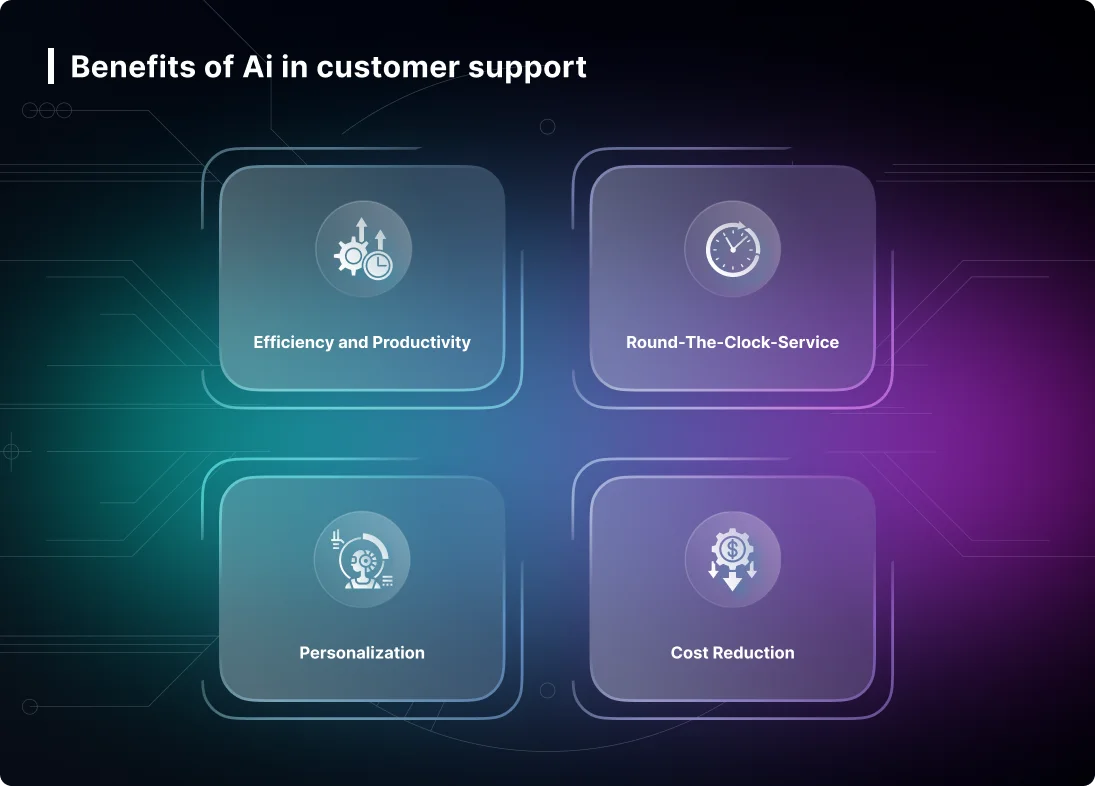Successful businesses all around the globe are adopting AI-powered customer service as the new standard – an innovative technique to assist around-the-clock by fusing artificial intelligence in consumer care. The implementation of AI-based technologies is not only crucial for keeping pace with current technological development, but it is also essential for maintaining competitiveness in the modern corporate climate. When used effectively, artificial intelligence for client service improves customer experiences, encourages loyalty, and increases productivity.
In this article, we are going to discuss what role AI plays in client service automation, why is AI client support important, and how Sephora and Domino’s managed to move their business to the next level with the help of AI powered customer service.
What is AI customer service
Artificial intelligence customer service represents the use of Artificial Intelligence technologies in providing client assistance. It is a dynamic intersection of high technologies and consumer support, resulting in efficient, automated, and personalized consumer interactions.
It relies on machine learning (ML) and natural language processing (NLP) to mimic human-like interaction, comprehend client inquiries, and provide precise, relevant solutions. ML enables these systems to learn from each interaction, adapting and improving their responses. Meanwhile, NLP allows interpreting human language in all its complexity, including colloquialisms, slang, and varied syntax, ensuring that consumer communication is understood in the context it is meant.
Three facets of AI customer service we are going to focus on are the following:
- Chatbots
These are the modern intelligent virtual assistants capable of interacting with people in real-time, answering inquiries, and performing tasks. They offer immediate, round-the-clock assistance, reducing response time and increasing client satisfaction. AI chatbot customer service helps to handle routine tasks efficiently and frees up human agents to tackle more complex, high-value issues. - Implementation of AI
This takes the capabilities of smart chatbots and amplifies them, leveraging deep learning and data analytics. It offers personalized client experiences, uses predictive analytics to anticipate needs, and provides proactive support. This level of consumer support is not just about answering queries; it’s about understanding user behavior, personalizing interactions, and enhancing the overall client experience. - Process automation
It encompasses all automated processes and systems in the client support workflow, from self-service portals and automated emails to chatbots and intelligent virtual assistants. Automation streamlines operations, reduces human error and optimizes resource allocation. Regardless of scale, it allows companies to deliver consistent, high-quality client support.
AI client support is revolutionizing how businesses interact with their clients, offering unprecedented efficiency, personalization, and accessibility. As we advance in this AI-driven era, businesses must adapt to these changing dynamics to remain competitive. The future of consumer support is not merely human or artificial intelligence, but a hybrid model where both strengths are leveraged to deliver exceptional consumer experiences.
Evolution of AI in customer service
The humble beginnings of AI in client support can be traced back to the advent of Interactive Voice Response (IVR) systems in the 1970s. These systems automated the call-routing process, sparing consumers the wait to connect with the appropriate department. As technology evolved, the role transitioned into more complex tasks. During the early 2000s, rudimentary chatbots emerged, automating basic text-based interactions based on predefined rules and decision trees. However, their lack of contextual understanding and flexibility was a hurdle.
The true metamorphosis began with integrating machine learning and natural language processing into AI client support systems. These algorithms use data to learn and improve actions, eliminating the need for explicit programming for every situation. Simultaneously, natural language processing technology is designed to understand, interpret, and generate human language in a valuable and meaningful way.
When fused, ML and NLP created an environment where conversational bots understand consumer queries better and learn from them. These technologies brought advanced systems, such as intelligent virtual assistants, offering a far more personalized and efficient client experience.
Possible Benefits of AI in customer service
Statistics shows that customer service is one of the most noticeable areas where artificial intelligence has had an essential impact across a number of industries. Businesses now work in a digital-first environment, and artificial intelligence (AI) has emerged as a game-changer, bringing about a major shift in how businesses connect with their customers.
Incorporating AI into your company brings a wealth of advantages to companies of all sizes. Not only it elevates the consumer experience, but it also heightens productivity, cuts costs, and delivers personalized experiences.
Efficiency and productivity
One of the major advantages is the boost in efficiency and productivity. Artificial intelligence, especially through chatbots and automated systems, handles numerous client inquiries simultaneously, improving response time. It is crucial because 90% of clients expect an “immediate” response, according to a Hubspot study.
Additionally, it frees client support representatives to concentrate on more challenging, high-value jobs by automating repetitive operations. This change in workload enhances productivity, which results in better resource allocation and increased job satisfaction among employees.
Cost reduction
Operational expenses are reduced with digitalized client service. By eliminating the need for human participation, typical processes and inquiries are automated, reducing labor expenses. Additionally, managing AI-powered solutions uses fewer resources than managing conventional client support personnel, which lowers overhead expenses.
Furthermore, the improved efficiency and reduced error rate with AI customer support prevent costly mistakes, providing long-term savings. In fact, according to a study by IBM, enterprises spend $1.3 trillion on 265 billion client service calls each year, and AI helps them save up to 30% of this cost.
Round-the-clock service
With AI customer service, companies provide round-the-clock support, considering that AI doesn’t sleep or take breaks. This is a significant benefit in the modern, global market, where clients want support at any time of the day. Conversational bots ensure that clients always get prompt replies, increasing consumer loyalty.
Personalization
Artificial intelligence provides a level of personalization that is challenging to achieve with human agents alone. AI systems consider a user’s behavior, interests, and previous interactions to deliver a truly customized experience.
It employs machine learning to gradually comprehend a client’s demands and preferences and then modify its replies. It anticipates behavior and requirements in the future, enabling organizations to solve problems or provide pertinent suggestions proactively. It’s especially important because Twilio company has made an interesting conclusion after a customer survey – 60% of shoppers say they’ll become repeat clients if they receive a personalized experience.

Case studies of AI customer service success
There are several examples of businesses that have successfully harnessed AI for customer service, with impressive results.
- Sephora
The world’s largest cosmetics retailer, Sephora, has effectively integrated artificial intelligence techniques to improve the help line. Clients get beauty advice from AI-powered chatbot based on their skin type, preferences, and concerns. Sephora has enhanced consumer engagement by offering tailored product suggestions and advice, which has resulted in a rise in revenue.
Key takeaway: Personalized AI service enhances the shopping experience, increasing sales and client loyalty. - Domino’s pizza
Orders are processed by a chatbot powered by an AI engine dubbed “Dom” for Domino’s Pizza. Clients only contact Dom to make an order, and the chatbot even keeps track of their most popular orders for future speedier service. This has greatly increased order accuracy while also streamlining the ordering process.
Key takeaway: AI in customer service makes transactions smoother and more convenient, improving consumer satisfaction and repeat business.
Try our conversational AI in your business
The case studies show that AI has a significant and wide-ranging influence on consumer service. Efficiency, cost-effectiveness, and client satisfaction have all improved for businesses ready to engage in AI client assistance.
Companies cannot afford to overlook the advantages of AI client service in today’s competitive business environment when client experience is a critical differentiation. Organizations fulfill the growing needs of contemporary clients for individualized, prompt, and efficient service by using AI-powered products. Artificial intelligence transforms product service and is no longer just a far-off idea. It’s a tool that enables companies to provide better client support, strengthen their competitive edge, and grow their company.
AI is altering what it means to be a client-centric organization, not simply how product services are provided. For this reason, we’ve created a conversational chatbot that aims to automate 85% of all consumer inquiries. To assure you that our AI chatbot automates most client inquiries, here’s our recent case study describing how we helped a marketplace with over 7,000,000 monthly users.
If you’re searching for the latest innovations to make business more efficient, we invite you to try our chatbot. We will help to free up your client support team and integrate a new digital team member into your company’s ecosystem. With no setup fee or additional charges, we are eager to assist in automating your business. If you are unsure whether the AI conversational bot will fit your company, we offer to try a free demo version of the chatbot. Try it, see how well it aligns with your niche, and take the first step in your customer service automation.
